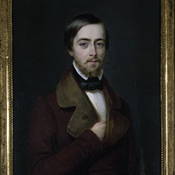
public domain
Joseph Méry
Librettist
Biography
Joseph Méry
Joseph Méry was a French writer, librettist, poet, and journalist whose literary versatility and flair for drama made him a notable figure in 19th-century French arts and letters. Born on January 21, 1797, in Marseille, France, Méry showed early promise as a writer and moved to Paris, where he became active in literary and political circles. Known for his wit, imagination, and prolific output, he wrote across genres—including poetry, novels, essays, and plays—but is best remembered today for his contributions to French opera as a librettist.
Méry often collaborated with other writers and composers, bringing a vivid narrative sense and poetic sensibility to his libretti. His most famous contributions to opera came through his partnerships with composers like Giuseppe Verdi and Charles Gounod. One of his most significant achievements was co-writing the libretto for Verdi’s grand opera Don Carlos (1867) alongside Camille du Locle. Based on Friedrich Schiller’s play, the libretto melded historical and personal drama, and remains a staple of the operatic repertoire for its emotional complexity and political intrigue.
Méry also co-authored the libretto for La reine de Saba (The Queen of Sheba) by Charles Gounod and worked on La Juive by Fromental Halévy—though the extent of his involvement in that work is debated. In all his collaborations, Méry demonstrated a talent for adapting dense or historical source material into compelling stage narratives, contributing to the rise of French grand opera during the Romantic period.
Outside the opera house, Méry was a popular novelist and a sharp political commentator, known for his satirical edge and allegiance to liberal and republican ideals. His writing often reflected contemporary issues, blending fact and fiction in ways that engaged a broad readership. He was also known for his interest in speculative fiction and fantastical stories, which aligned him with other imaginative writers of his time.
Joseph Méry died on June 17, 1866, in Paris, leaving behind a diverse body of work that straddled journalism, literature, and the performing arts. While many of his writings have faded from popular memory, his contributions to opera libretti—especially Don Carlos—ensure that his legacy endures in the world of classical music. Méry remains a symbol of the 19th-century French intellectual: imaginative, politically engaged, and deeply committed to the power of the written word.
Shows
Shows associated with Joseph Méry
Songs
Songs from shows associated with Joseph Méry
Quizzes
Quizzes associated with Joseph Méry
Additional Information
N/A